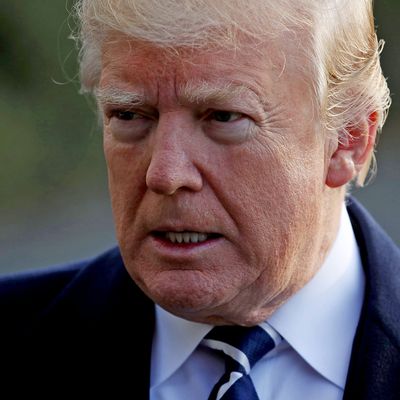
Republicans have tended to dismiss Donald Trump’s attacks on the rule of law as the naïve utterances of a political novice. When confronted with evidence that Trump has repeatedly pressured Senate Republicans to end their investigation of the Russia scandal, Republicans told the New York Times that the president merely “still has the mind-set of a businessman rather than a politician.”
But Trump continues to make it chillingly clear that his unceasing attacks upon the system are neither accidental nor a mistake borne of naïvete. Trump believes he commands the government with the same totality he commands his business. His lawyer, John Dowd, has elevated this assumption to official presidential doctrine in an explosive interview with Mike Allen. A “president cannot obstruct justice because he is the chief law enforcement officer under [the Constitution’s Article II] and has every right to express his view of any case,” he says.
It is easy to hyperventilate about various Trumpian offenses, but Dowd is claiming on Trump’s behalf virtual immunity from the law. The powers he is asserting, and the dangers it would bring, have almost no limit.
There are two ways a president could abuse the power of law enforcement. The first is offensive, to direct it as a weapon against his political enemies. The second is defensive, shielding himself and his allies from any accountability, and thereby enabling them to commit crimes without consequence. Trump has expressed frequent interest in both methods. Trump has harangued the FBI and the Department of Justice for failing to prosecute Hillary Clinton for her use of a private email server. Clinton’s email server was investigated by the FBI in 2016, but the bureau concluded no rational prosecutor could bring charges. Trump has shown no compunction in asserting his belief that, now that he controls the presidency, if Trump demands the FBI lock somebody up, they should lock her up.
More pertinent to Trump’s needs of the moment is his demand for immunity from any mechanism of legal accountability. Trump does not accept the legitimacy of any legal restraint. He repeatedly demanded the FBI director pledge personal loyalty to him, and fired him when he failed to demonstrate his obsequience to the president’s satisfaction. He did something similar to the U.S. Attorney in New York, who has legal jurisdiction over much of Trump’s financial world. He has publicly attacked Special Counsel Robert Mueller and threatened, publicly and privately, to fire him. (He has reportedly held off because Ty Cobb, another of his lawyers, has unrealistically promised Mueller will conclude his investigation quickly and in Trump’s favor.) The new reports of his attempts to quash the Senate investigation fit a pattern that has no exceptions.
It is true, as Trump’s Republican defenders say, that he does not grasp the differences between his role as business owner and his role as elected official. But that is not a defense. It is a restatement of the accusation.
Trump’s belief that the entire government should operate on his personal behalf in exactly the same way as his employees at the Trump Organization is a worldview incompatible with republican government. Imagine the 2020 election conducted in an atmosphere in which Trump can sic law enforcement upon his opponent, and in which his supporters can commit any crimes they want on his behalf, secure in the knowledge that the president will protect them from prosecution.
Limits on the president’s authority over law enforcement, both formal and informal, are an essential bulwark against authoritarianism. Trump has been testing those limits since he assumed office. He and his agents continue to batter them, and each new attack is met with slightly less incredulity as numbness sets in.






























